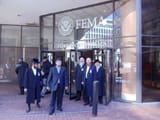>Wayde and I were called in to look for bodies after hurricane Katrina. By the time we got there, other teams had been in the Ninth Ward for two weeks or more. When they had collected the bodies earlier, they’d just kind of scooped them up, and arms and legs and other pieces were left behind. Then there was the voodoo stuff. The dogs would be hitting on a cupboard and we’d pop it open and there would be all these remains—human leg bones—braided with wire. Then you’ve got the cemeteries that are like crypts, and they all got flooded. You’ve got parts of bodies that were left behind. And then you had real people who hadn’t been found. It was nasty. The whole city was out of control. No traffic lights, no controls, roving gangs and gunshots all night long.
>The next day, we came back to the hotel at the end of the day, our dogs and ourselves filthy as usual, hot and sweaty and needing to shower and care for our dogs, and we found we couldn’t get in our rooms. Our keys didn’t work. We went to the front desk to see what the problem was, and the manager said, “Well, you need to speak to those people over there.”
>He pointed to some women sitting at a little desk. They had a banner that said: FEMA Community Relations Team. These were not the people we’d been reporting to. So I walked up to these people, in my uniform, and I said, “We need to get into our rooms.” One woman said, “Well, you need to fill out this affidavit.” I looked at it, and it was an affidavit requesting federal aid. I said, “Ma’am, you don’t understand. I’m here as part of the cadaver dog team. I have nothing to do with being a refugee. I’m helping recover bodies.”. “Well,” she replied, “if you don’t sign it, you’re not going to get authorized to go in.” So we called our supervisor and he said he’d come in.
